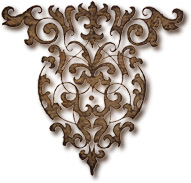Introduction
This 1593 version of Ibn Sina's Canon of
Medicine has been digitized and published by
the Saab Medical Library as a contribution to the
online body of historical medical knowledge for
research and teaching purposes.
I would like to thank Mr. Khalil T. Nassar for
the english translation. I would like to thank him
also for his patience and perseverance in this
task.
Also I would like to thank Mrs. Nadine Shoujaa
Timani for typing and retyping the English and
Arabic texts. My thanks go to Mrs. Nada Sbaity
for coordinating the realization of this work and
to Mr. Børre Ludvigsen for the conception and
realization of this work.
Hilda T. Nassar - Director,
Medical Librarian
Concept, design, digitizing and
authoring: Børre Ludvigsen, Beirut
2002-2007.
A short biographical note on Ibn Sina
(Avicenna) by Abd al-Rahman al Naqib, professor
at Mansoura University, Egypt:
(This biographical note is
part of an article orginally published in
UNESCO's Prospects:
the quarterly review of comparative
education, vol. XXIII, no. 1/2, 1993, p.
53-69, and is © UNESCO.)
The man and his age
The Sheikh al-Ra'is Sharaf al-Mulk Abu 'Ali
al-Husayn b. 'Abd Allah b. al-Hasan b. 'Ali Ibn
Sina (known in Europe as Avicenna) was born in
the village of Afshana in the vicinity of Bukhara
(in what is now Uzbekistan), in 370 AH (980 AD) -
the generally accepted date - of an Ismailian
family concerned with intellectual sciences and
philosophical inquiry, all of which had its
effect upon the scientific career of
Avicenna.
So Avicenna lived in the fourth century of the
Islamic era, the most flourishing 'Abbasid period
in respect of learning and knowledge, which
stands in complete contrast to the political
situation at that time. Learning was much in
demand, scholars were numerous, libraries were
filled with the outpourings of the scholars of
Islam, and with translations made from the
sciences of other nations in accordance with the
desires of caliphs and viziers.
It was just around the time of Avicenna's
birth and in the subsequent years that Islamic
Arabic culture reached its peak. Since the Arabic
language was the accepted vehicle for the
transmission of knowledge in this era, Avicenna
studied Arabic under Abu Bakr Ahmad b. Muhammad
al-Barqi al-Khwarizmi. As soon as he had mastered
Arabic (his mother tongue was Persian), his
father obtained for him a teacher of the Qur'an
and another for literature. The young pupil
learned quickly from his two teachers, and before
he was 10 years old he knew the Qur'an and a
considerable amount of literature as well,
becoming 'almost a prodigy', as Avicenna says of
himself. Next he developed a leaning towards
philosophy, geometry and Indian mathematics, so
his father sent him to the school of Mahmud
al-Massah' (the surveyor), a man learned in
arithmetic, algebra and the movement of the
heavens, as reported by al-Bayhaqi. He also
studied figh (Muslim law) and the Sufism movement
with Isma'il al- Zahid al-Bukhari. And no sooner
had Abu 'Abdallah al-Natli, the philosopher,
arrived in Bukhara than Avicenna's father invited
him to his house, hoping that the boy would learn
intellectual subjects from him. If al-Natli had
any noticeable success, it is that he diverted
the boy from a preoccupation with law and Sufism
in favor of the theoretical sciences and
philosophical studies.
Before long, the professor sensed that the boy
no longer needed him, for Avicenna was very
anxious to acquire learning and had a real
craving for the sciences of wisdom. He was then
attracted by medical science, and devoted himself
to it for a brief time, until he surpassed all
the scholars of his age in this science. Avicenna
says: "Then I desired to study medicine, and took
to reading the books written on this subject.
Medicine is not one of the difficult sciences, so
naturally I became proficient in it in the
shortest time, until the excellent scholars of
medicine began to study under me. I began to
treat patients, and through my experience I
acquired an amazing practical knowledge and
ability in methods of treatment."
Avicenna was not content with the theoretical
study of medicine, but he also practiced it from
humanitarian motives and in order to put his
learning to good use. He achieved all this while
still no more than 16 years of age. Then he
devoted himself to intensive study and reading
for a year and a half, in which time he read
through logic and all known sections of
philosophy. Before Avicenna had reached the age
of 18, his scholarly fame for philosophical
inquiries and medical knowledge had spread far
and wide.
It is clear from Avicenna's biography that he
was quick to learn, with a vast memory, and wrote
with ease. When he was 21 years old, he composed
the book al-Majmu (The Compendium), at the
request of some of his pupils; in this he dealt
with all of the theoretical sciences, except
mathematics. Despite the political turmoil
reigning in the land of Transoxania, which
obliged him to move house a number of times, and
the fact that he was acting as minister for
certain princes, this did not prevent him from
both studying and teaching science. He always had
his own students and his study circles wherever
he went, and this continued right up to the time
of his death, on a Friday in Ramadan in 428 AH
(1037 AD). He was buried at Hamadan in
Persia.
(The
complete article is available here as a
.pdf file.)

|



